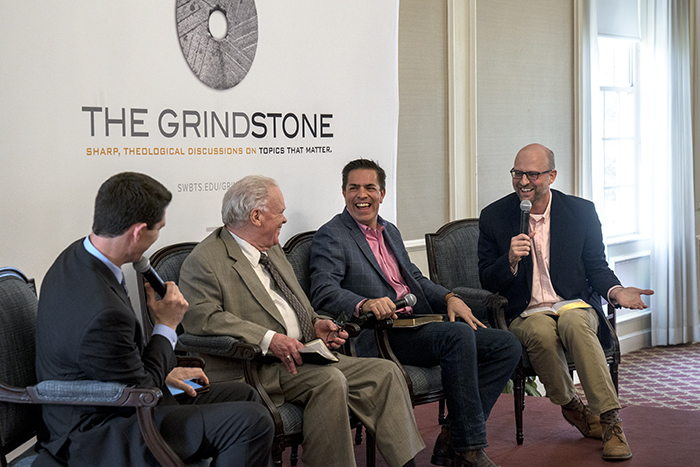Grindstone panelists discuss church governance

“We agree that God is supposed to rule the church, but how does that work itself out?” Southwestern Seminary President Paige Patterson and two other paneliststackled that question along with the topics of church leadership roles, pastoral functions and the validity of a lifelong calling to God at an April 10 Grindstone discussion on church governance. The other panelists were Mark Howell, senior pastor at Hunter’s Glen Baptist Church in Plano; andJonathan Leeman, editorial director for 9Marks and the author or editor of a number books on church governance, including Understanding the Congregation’s Authority and Understanding Church Discipline.
The panelists agreed that while the Bible does not include comprehensive instructions for church leadership, its guidance is adequate, with room for interpretation. God has left some latitude, Howell said, “or He would have made it more clear in the questions that we ask.”
Leeman raised the differences between elder-ruled or elder-led congregations—“whether elders or the congregation have the final say.” Many Baptist congregations have splintered over minor issues, Patterson said, “fussing over the color of the curtains … and so a movement developed toward elder rule, to give elders the final say in matters. Congregations were never meant to be a debating society.”
Leeman agreed that congregations should not be charged with steering their own policy. “We need to seek the face of God, and let God determine the direction of the church,” he said.
And people do seek to direct the church, Leeman continued. “You’ve got all these people coming to Washington, D.C., because they want some kind of recognition—‘oh, he’s a general, he’s a senator’—but then after they arrive, they acquire a new set of ambitions to serve the church. You have people asking for job demotions because they want time available to serve as an elder.”
The three concurred that it is acceptable for a congregation to have multiple pastors or elders, and they agreed that terminology that identifies church leadership sometimes overlaps, referring to church roles in different ways. “There are times in my ministry when I am a shepherd, or overseeing, or doing both,” Howell said.
“I have the deepest adversity for people who treat the pastor’s role as just preaching,” Patterson said. “The job is pastoral care—and in large churches, more than one pastor is a necessity.” The pastoral role is the primary role, said Patterson, who also noted that terminology sometimes blurs the lines of responsibility.
He recalled that he initially declined to accept the head role at Southwestern Seminary. “The position was ‘president and CEO,’” he recalled. “That isn’t what God called me to do. I am not a business officer. I had rather just be called ‘pastor.’”
After considering the array of tasks that a pastor is called to fulfill, the panel differed on whether those roles define a pastor’s life. The calling to be a pastor is not always lifelong, Leeman said. “I don’t think ‘pastor’ or ‘elder” is emblazoned on my soul forever.” Patterson disagreed: “If God calls, the calling is permanent.”
Following their discussion, panelists fielded questions from the audience on a variety of ministry topics. In addition, Leeman offered complimentary copies of several of his books to those who attended.



